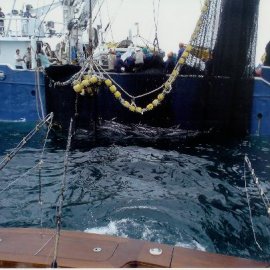Big Fish Ideas
-
English
-
ListenPause
I’m Peter Neill, Director of the World Ocean Observatory. We have spoken often of the rapidly depleting supply of fish available for global consumption due to over-fishing, particularly in the deep ocean, the vast expanse outside the limits of national jurisdiction where large vessel, frequently confusingly flagged and owned, take fish outside of any established treaties, national limitations, regulations, quotas, or concerns that any species may be taken without limit, even to the point of extinction. The European Union describes the situation as follows: Illegal, unreported and unregulated fishing (IUU) depletes fish stocks, destroys marine habitats, distorts competition, puts honest fishers at an unfair disadvantage, and weakens costal communities, particularly in developing countries. The EU is working to close the loopholes that allow illegal operators to profit from their activities: • The EU Regulation proposes to prevent, deter and eliminate illegal, unreported and unregulated fishing (IUU) entered into force on 1 January 2010. The Commission is working actively with all stakeholders to ensure coherent application of the IUU Regulation. • Only marine fisheries products validated as legal by the competent flag state or exporting state can be imported to or exported from the EU. • An IUU vessel list is issued regularly, based on IUU vessels identified by Regional Fisheries Management Organizations. • The IUU Regulation also offers the possibility to blacklist states that turn a blind eye to illegal fishing activities. • EU operators who fish illegally anywhere in the world, under any flag, face substantial penalties proportionate to the economic value of their catch, which deprive them of any profit. Couched in bureaucratic speech, these actions are intended to confront and limit what is nothing other than criminal enterprise. The question is how to enforce these actions, along with those of the UN Food and Agriculture Organization that addresses these same issues at the international level? In 2009, the UN adopted the Port State Measures Act that, according to a recent editorial in the NY Times, “allows nations to deny port entry and services to foreign vessels suspected of illegal fishing. A suspect vessel could be immediately inspected or turned away and other ports warned. Port-side enforcement would help to keep illegally caught fish out of the marketplace, while also giving the authorities another means to check vessels for abused and imprisoned crews, trafficked immigrants, and illegal drugs.” The proposed treaty has 11 of the 25 signatory nations required to ratify. The US Senate voted approval in April. Legislation to codify and enforce must follow. But even if we were successful in such an endeavor, will it be enough to counter the precipitous decline in fish populations, to reverse this global tragedy of the commons? Recently an article in Phys.org, an on-line science blog, reported a proposal by Crow White and Christopher Costello, two University of California research scientists, advocating a stunning idea to reverse the trend: close the high seas to fishing altogether. “Sound like a radical notion?” the entry questions. “Not according to White and Costello, who found that such a policy could actually provide a triple-bottom-line benefit, increasing not only global stocks of high-value species, but also fisheries harvests and profits from them. The idea is that closing the high seas to fishing would allow fish populations to rebuild, and because the fish migrate, it would also generate a "spillover effect" as some fish from protected international waters find their way into the exclusive economic zones (EEZs) of each nation, where they could be harvested.” Using computer models, the investigators “found that closing the high seas could more than double both populations of key species and fisheries profit levels, while increasing fisheries yields by more than 30 percent. From a policy perspective, the results are incredibly important because they indicate a win-win-win—food, profit, conservation—scenario from closing the high seas; further, even though the main study focus was on the profitability of fisheries, this policy would represent possibly the largest conservation benefit ever enacted in the world's oceans.” These are some big fish ideas, the kind of policies and proposals we must embrace if we are to recover from our past excesses and mistakes. We must regulate or exclude from the market those who are indifferent to long term needs. And we must act boldly beyond that, take responsibility beyond regulation and enforcement, transcend half-measures and ineffective compromises, and reverse our thinking from short term gain to short term pain that in the end will reward us with a marine food supply equal to the world’s burgeoning population and its future survival. We will discuss these issues, and more, in future editions of World Ocean Radio.
Fish supplies are being rapidly depleted due to overfishing, especially in the deep ocean outside of national jurisdiction. The EU has developed actions intended to confront and limit illegal, unreported, and unregulated fishing (IUU); beyond these measures, two California scientists are advocating for a radical idea: close the high seas to fishing altogether. In this episode of World Ocean Radio, host Peter Neill will share the ideas outlined in the study and will suggest that it is just such a radical notion that we must embrace if we are to allow the marine food supply to recover from our past excesses and mistakes.
__________________________________________________________________________
Peter Neill, host of World Ocean Radio, provides coverage of a broad spectrum of ocean issues from science and education to advocacy and exemplary projects. World Ocean Radio is a weekly series of 5-minute audio essays available for syndicated use at no cost by college and community radio stations worldwide. Contact us for more information or to become a broadcast affiliate.
Image: Tuna purse seiner: illegal fishing by an Ecuadorian tuna boat in Panamanian waters.
Credit: CONAMAR Foundation | Marine Photobank
Resources from this episode:
< Could Closing the High Seas to Fishing Save Migratory Fish? | Phys.org
< EU Rules To Combat Illegal, Unreported, and Unregulated Fishing
- Login to post comments



